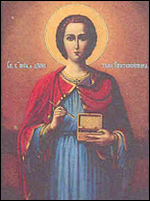|
On August 9th (July 27th, old style) the Church commemorates the Great-Martyr and Healer Panteleimon.
St. Panteleimon was born in Asia Minor, in the city of Nicomedia, of wealthy and noble parents. His father was a devoted pagan, while his mother was a Christian. His initial upbringing he received from his mother, who instructed her son in the true faith and Christian piety. Unfortunately, the mother soon died and the youth was left in the care of his father, who sent him to pagan schools. Being tremendously gifted and possessing a clear mind, Panteleimon graduated from school with honors. In accordance with his father’s wishes, he studied the art of medicine and was groomed for the position of court physician. But then, by God’s providence, the saint encountered a certain elderly priest, Ermolas, who began having daily spiritual discussions with Panteleimon, so that the latter would come to know the One True God.
|

The Great-Martyr and Healer
Panteleimon |
Once, as Panteleimon was on his way to medical school, he found a dead child on the road, who had been bitten by a poisonous snake, and the snake itself lying coiled nearby. At first the saint moved away in fear, but then he thought to himself: “Now is the time for me to test the truth of all that the elder Ermolas told me.” Then the saint prayed to God, saying: “O Lord Jesus Christ, although I am unworthy to call upon Thee, but if Thou wishest me to become Thy servant, show Thy might, that by the power of Thy name this child would arise and the snake would die.” And immediately the child arose, as out of a deep sleep, well and alive, while the snake cracked in half. Then Panteleimon came to believe in Christ absolutely and, giving thanks to God, immediately went to Ermolas to be baptized. From that day St. Panteleimon gave himself and all his knowledge over to the service of mankind: he treated the sick, helped the poor and never took any payment for it. Gradually he tried to urge his father away from idol worship and lead him to Christ. Once, a blind man, who had been to see all the famous physicians in the city, and who had spent all his wealth on them without getting any help, was brought to Panteleimon as a last resort. Panteleimon’s father, Eustorgius, advised his son not to accept the case at which even the best physicians had failed, in order to avoid ridicule, but Panteleimon said to his father: “Wait a while, father, and you will see the power of my healing.” With these words he touched the blind man’s eyes with his fingers, saying: “In the name of my Lord Jesus Christ, Who is the light of all the blind, open your eyes.” Immediately the eyes of the blind man opened and he could see. At that same moment Panteleimon’s father, together with the blind man who could now see, came to believe in Christ and were later baptized by Ermolas. And all rejoiced over the grace and the power of Christ. Afterwards Eustorgius threw out all the idols in his house and, after a brief time, departed from this world. Panteleimon, having received a rich inheritance from his father, gave it away to the poor, widows and orphans. He visited those who suffered in prisons and comforted them while offering them healing and charity. In his medical practice he was aided by the grace of God, because he received from above the power of healing; and he cured illnesses not so much with medications as by calling upon the name of Jesus Christ. Thus the saint fully justified his name of Panteleimon, which means all-charitable.
However, the other physicians, envious of the saint’s medical successes, denounced him as a Christian to Emperor Maximian, and the heartless persecutor ordered the saint to be cruelly tortured: his body was burned by tar torches, he was thrown into a cauldron of boiling water, he was beaten, tortured with wheels, thrown to wild animals. But the grace of God helped him endure all the tortures and to perform miracles, which caused a multitude of people to believe in Christ. Thus, for example, the wild animals became meek and tame when the saint appeared in their midst, and came up to lick his feet while Panteleimon patted their heads; moreover, each animal tried to approach the saint in such a way as to have his head patted! Afterwards, the enraged emperor, seeing the steadfastness of Panteleimon’s faith and all the miracles he performed in the name of Christ, ordered the saint to be beheaded.
|